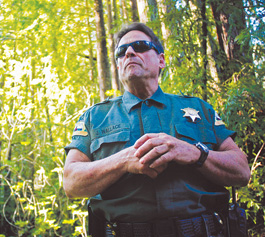home | metro santa cruz index | news | santa cruz | news article

Photograph by Curtis Cartier
A WORRIED MAN: Chief Ranger John Wallace says he's 'never seen the Pogonip this dangerous.'
Ranger Danger
Rangers keep off certain Pogonip trails since handgun incident
By Curtis Cartier
A STANDARD-ISSUE Santa Cruz park ranger uniform comes with a forest-green shirt and slacks, hiking boots, a wide-brimmed hat and a tool belt containing a Leatherman multitool, a flashlight, a notepad, a two-way radio and a can of pepper spray. Nowhere in any pocket, holster or clip is a device designed to assist a ranger in a gunfight. So when Rangers Brian Watson and Gar Eidam stumbled onto an illegal campsite in the Pogonip last month and found $850 worth of heroin and a loaded .357 magnum handgun, they radioed for the Santa Cruz Police Parks Unit to come in.
Worried for his employees' safety, and reliant on a depleted police parks unit that's down from five officers to just three, Santa Cruz Chief Ranger John Wallace is pulling his rangers off certain trails for fear that the next gun they find might be gripped in a gangster's hand.
"I've been doing this a long time, and I've never seen the Pogonip this dangerous," says Wallace, who has directed his staff to stay off parts of the Pogonip Creek Nature Loop, Lookout Trail and anywhere near the railroad tracks unless they have an armed police escort. "My main objective, above everything else, is to make sure all of my rangers come back safely and get home to their families. I would never be able to live with myself if something happened to them out there."
In the Pogonip, Sureņo gang members, mostly from Mexico, control a bustling black tar heroin trade and use the mazelike trails of the open space like city streets and alleyways, running and hiding when police show up. Both drug dealers and drug users often camp illegally in the park and. Under city policy, when a ranger comes across an illegal campsite with people occupying it, he or she is not to contact the campers but instead report the site to city police and let them investigate. Wallace says lately, however, that it can take up to two weeks for police officers to investigate a camp after it's reported, by which time any occupants are usually long gone.
"The police do a great job, they're just really understaffed right now," says Wallace, who makes a point of heaping praise on Santa Cruz's finest. "I'd love if they could make it out quickly every time, but sometimes I think they have other things to do."
Santa Cruz Parks Superintendent Steve Hammack says police provide a consistently fast response to rangers' calls and denies that any trails are unfit for rangers to patrol. Santa Cruz Police spokesman Zach Friend, however, confirms Wallace's assertions that the parks unit is indeed short-staffed and that at times investigating one of the park's many illegal campsites does not top the priority list.
"We have a symbiotic relationship with the park rangers," Friend says. "We're hoping to hire replacements to fill the open spots in the parks unit, but this takes time. Until then, the safety of the parks rangers is paramount and they shouldn't be putting themselves in dangerous situations."
Meanwhile, during an afternoon patrol through the rain-soaked Pogonip during which he grills familiar characters about where the illegal camps are, Wallace is quick to remind a reporter that while his perspective might differ from those of his colleagues and superiors at the city, he's "just calling it like I see it."
Machetes and Guns
It would be inaccurate to say law enforcement is not active in the city's greenbelts and open spaces. SCPD records show that the parks unit confiscated 27 weapons in the last two years, including meat cleavers, machetes, nunchucks, brass knuckles, axes and semiautomatic guns. Rangers, who also issue citations for everything from public intoxication to dogs off leashes, wrote 650 tickets last year. Roughly 75 percent were for either illegal camping or alcohol-related violations.
And while drug dealing has long been typical in the park, armed gang members doing the dealing is a more recent trend. Despite the danger, for Wallace, a burly former firefighter and longtime bodybuilder with arms like sycamore trees, the decision to keep his rangers off certain trails goes against the methods that, for more than six years in the early 2000s, he practiced while he was quite literally the city's "Lone Ranger."
"That was a different time then. I was the only ranger in the city and I would talk to drunks and drug camps all the time and write them tickets and try and get them out of there. Looking back, it was really reckless," he says. "It kills me to keep my rangers off some of the trails right now, but the Pogonip has gotten worse than I've ever seen it, and since they're unarmed they really have no business putting their lives at risk over some drug users or gang members."
Send a letter to the editor about this story.
|
|
|
|
|
|